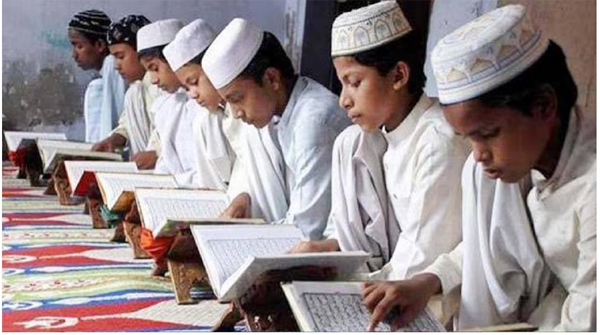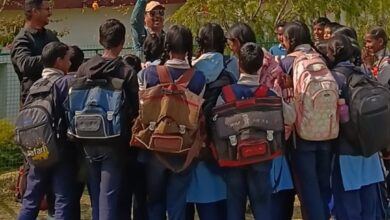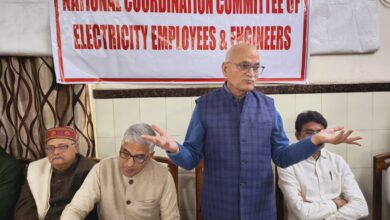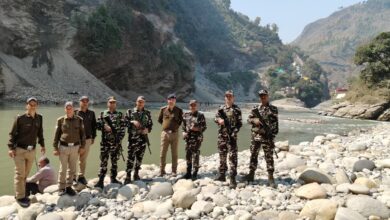Muslims to challenge Uttarakhand Minority Education Bill 2025

Muslims to challenge Uttarakhand Minority Education Bill 2025
S.M.A. KAZMI
Dehradun, Oct 7
With Uttarakhand Governor giving ascent to the Uttarakhand Minority Education Bill 2025 passed by the state assembly during the monsoon session held in August this year, the agitated Muslim community of Uttarakhand has planned to again knock at the doors of judiciary against the new legislation.
A meeting of clerics and those managing the Madrassas in Uttarakhand called by the national president of ‘Jamiat Ulema -e-Hind’ Maulana Arshad Madni will be held on October 8, 2025 at Deoband to discuss the issue.
The Muslim community which is at the receiving end of ire of ‘Sangh Parivar’ led by Chief Minister Pushkar Singh Dhami believe that the new legislation is aimed at targeting the Muslim ‘Madrassas’ as part of vilification of the community. They are of the opinion that the new law is a clear violation of constitutional guarantee to the minorities to run and manage their educational institutions.
“ We are going to approach the state government against the law and then would go to the High Court to seek our constitutional rights,” said Fazlur Rehman, spokesman of the Jamiat. Already, ‘Jamait’ had been fighting legal cases against Uniform Civil Code (UCC) and sealing of Madrassas.
As per the new law that will be become applicable across the state after gazette notification the Uttarakhand Madrasa Education Board Act 2016 and the Uttarakhand Non-Government Arabic and Persian Madrasa Recognition Rules 2019 stand repealed from July 1, 2026. The state BJP government claim that a uniform law would be applicable not only to madrasas but also to educational institutions of other minority communities.
As per the new legislation, Uttarakhand State Minority Education Authority will be established to grant minority educational institution status. Any educational institution established by the Muslim, Christian, Sikh, Buddhist, Jain, or Parsi community will be required to obtain recognition from the authority to qualify for minority educational institution status.
After the law comes into effect, the Uttarakhand State Minority Education Authority will be established, consisting of a nominated chairperson and 11 members. The chairperson will be an academic from a minority community with 15 years or more of teaching experience, with a minimum of five years of experience in a higher educational institution. Six of the 11 members will be from minority communities. This includes one member each from the Muslim, Sikh, Christian, Buddhist, Jain, or Parsi communities, who belong to that religion or speak that language. Of the other five members, one will be a retired state government official, a secretary or equivalent. The second will be a social worker having 10 years or more experience in the field of school education, the third will be the Director General of School Education, the fourth will be the Director of SCERT, the fifth will be the Director of Minority Welfare.
Hafiz Shanazar, a spokesperson of the Uttarakhand unit of ‘Jamait-e-Ulema-e-Hind’ said that the law was part of the strategy to target Muslims and their educational Institutions. “ The law is aimed at hitting the Muslims and ‘Madrassas’ as part of vilification campaign of BJP like ‘ Love Jehad’, ‘Mazar Jehad, ‘Land Jehad’, ‘Thook Jehad’ and the recent ‘Nakal Jehad’,” he added.
The law proposes that the proposed Authority will ensure that education is imparted in accordance with the standards set by the Board of School Education, Uttarakhand. There are 465 Madrassas in Uttarakhand state. Interestingly, most of the Madrassas are running schools as per the norms of Uttarakhand Education Board and teaching NCERT books but the Chief Minister Dhami and the plaint media has been giving an impression that Madrassas are imparting something ‘objectionable’ education which needed to be brought under control and streamlined. “ Apart from teaching Holy Quran, we are having regular classes up to class 12 affiliated with Uttarakhand Education Board having NCERT books,” said Maulana Sharfat who is running a ‘Madrassa’ in Jeewangarh area near Vikasnagar town of Dehradun district.
“There are few ‘Madrassas’ which impart purely religious education and they are affiliated with Darul Uloom, Deoband. The repealing of Uttarakhand Non-Government Arabic and Persian Madrasa Recognition Rules 2019 is also a big blow for education of Arabic and Persian languages,” claimed Hafiz Shahnazar
The Muslims form the biggest minority group in the state with 13.95 per cent population as per state government data followed by Sikhs with 2.34 per cent population as per 2011 census. The Christians are 0.37 percent, Buddhists – 0.15 per cent and Jains-0.09 percent of the total population.
Butt surprisingly, except Muslims none of the minority communities having their large educational institutions have raised a voice against the law. Apparently the other minorities presumes that the new law is aimed at targeting the Muslims and ‘Maadrassas’ only.
The new law said that the proposed Authority will ensure that education is imparted in accordance with the standards set by the Board of School Education, Uttarakhand. A simple understanding says that all minority run educational institutions would have to adhere to the Board of School Education, Uttarakhand.
But in Dehradun and Mussoorie, there are old educational institutions which are affiliated to different board like ICSE , CBSE and even International Baccalaureate. Would all these schools be asked to adhere to Uttarakhand School Board curriculum like ‘Madrassas’.
Suryakant Dhasmana, Senior Vice-President and organisational Secretary of Uttarakhand Congress party alleged that these are attempts by BJP to polarise the society. “The BJP has again embarked on its’ strategy to target minorities particularly Muslims since next assembly polls are fast approaching. The ruling BJP is trying to deflect the attention from urgent pressing issues to Muslim bashing to polarise the society for political gains,” he charged.
He further said that most of the Christian, Sikh and Muslim educational institutions are operating in Uttarakhand for past more than a century with distinction and as per prevalent law and statute.
“ I wonder how Chief Minister would force all the minority educational institutions to follow Uttarakhand School Board curriculum as some schools follow CBSE and other ICSE patterns,” he added.
These ‘Madrassas’ affiliated with the Madrassa Board did get some benefits given by central government schemes started by Manmoham Singh Government which has since stopped after 2017.
The first scheme was to give money for infrastructure development by Government of India. However, none of the ‘Madrassas’ in Uttarakhand was given money on this count. The second scheme relates to providing grant to teachers by the central government. A B.ed teacher was to get Rs.12,000 and a graduate teacher Rs.6,000 per month as honorarium to improve the standard of ‘Madrassa’ education and encourage them to teach English, Science and Mathematics. The amount was not salary but was to be paid once in a year. The honorarium of 565 such teachers from 187 ‘Madrassas’ was not been paid since 2017 and the central government scheme was stopped and renamed.
There is misconception that subjects of Science, English and mathematics courses are not taught in ‘Madrassas’, it is fact that syllabus of Uttarakhand State Education Board is followed having all these subjects and National Council of Education Research and Training (NCERT) books are taught.






